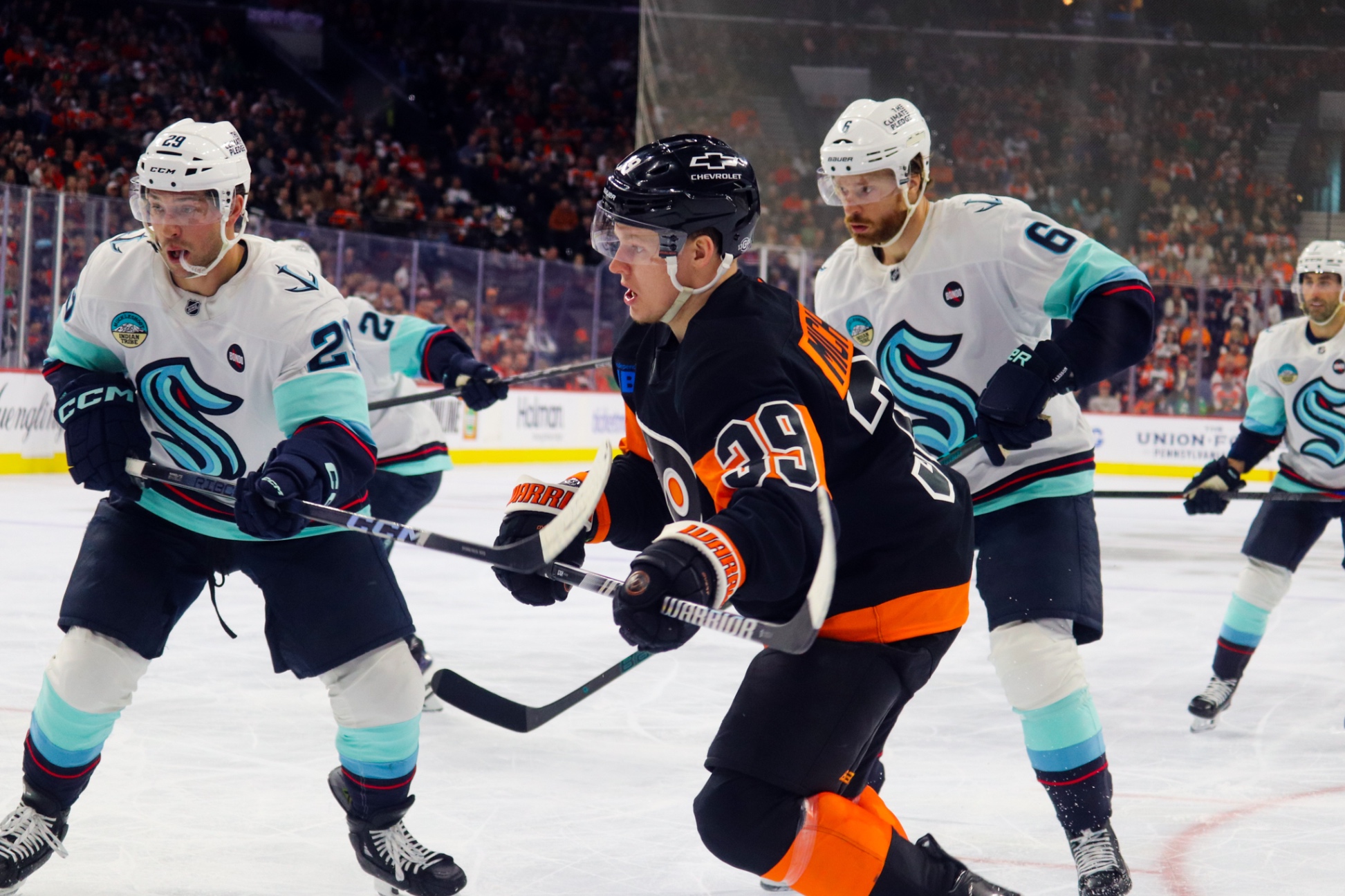The Philadelphia Flyers knew this homestand wasn’t going to be easy. But they certainly didn’t want it to go like this.

Philadelphia Flyers winger Matvei Michkov (39) looks for the puck against Seattle Kraken defensemen Vince Dunn (29) and Adam Larsson (6) at the Wells Fargo Center on Mar. 8, 2025. (Megan DeRuchie-The Hockey News)
After a frustrating 4-1 loss to the Seattle Kraken, the Flyers have now dropped three straight at home, and this one felt particularly disheartening.
They had their chances—plenty of them—but simply couldn’t finish. The power play remained lifeless, the defensive breakdowns were costly, and the energy just wasn’t there for long enough stretches of the game.
Sean Couturier didn’t sugarcoat it, calling it an “ugly” loss. John Tortorella was even blunter, saying, “It’s going in the wrong direction as each game’s gone by, and we’ve gotten worse.”
However, with a game against the Devils looming tomorrow, the Flyers don’t have time to dwell on it.
1. The Flyers Had Their Chances, but They Couldn’t Finish
There are losses where a team gets completely outplayed, and then there are losses like this—where the Flyers had every opportunity to score but just couldn’t capitalize.
They controlled stretches of the game, created quality looks, and tested Seattle’s defense. But none of it mattered because they simply couldn’t put the puck in the net, besides Owen Tippett's goal in the dying seconds of the first period.
It wasn’t just bad luck. There were moments of overthinking, missed nets, and some genuinely spectacular goaltending from Philipp Grubauer, who turned aside 23 of 24 shots. But the Flyers didn’t do themselves any favors, either. Too often, they settled for perimeter play instead of forcing their way into the dirty areas.
In games like these, where the offense isn’t clicking, special teams become even more critical. That leads us right into the next takeaway.
2. The Powerplay Continues to Frustrate
At this point, it’s not just a rough patch. And something's gotta give.
The Flyers had ample powerplay opportunities in this game, but once again, they couldn’t get anything going. They finished 0-for-5, extending their drought and raising even more concerns about their ability to generate offense when it matters most.
Tortorella didn’t mince words postgame, saying, “It’s going in the wrong direction as each game’s gone by, and we’ve gotten worse.”
That’s a pretty damning statement from a coach who has been reluctant to even discuss the powerplay in detail at times this season. But the frustration is understandable—the Flyers’ man advantage has been a glaring pitfall of their game, and it’s actively hurting their chances to win.
The biggest issue? A lack of movement. Too often, the Flyers’ powerplay gets stagnant, allowing penalty killers to stay in their structure without much effort. They aren’t generating enough high-danger looks, and they’re struggling to break down defensive units that stay disciplined.
If the Flyers want to stay in the playoff hunt, they have to find a way to fix this. They don’t need to be an elite powerplay team—they just need to be somewhat dangerous, just a little more productive. Right now, they’re just not that.
3. The Defense Struggled, and the Laughton Trade Looms Large
Cam York was a healthy scratch for this one, with Emil Andrae stepping in. The idea was to give York a reset, but the defensive struggles persisted, and it’s fair to wonder if taking him out actually helped anything. Jamie Drysdale continues to show improvement but as a whole, the defense wasn’t sharp enough.
Sam Ersson had a better night than his previous starts, making 29 saves and keeping the Flyers in the game for as long as he could. But even he admitted he’d like a couple of those goals back.
"[My play] has not been up to my standards here the last few games," he said postgame. "It's up to me to find my game again and find it quick."
And beyond individual performances, the defensive breakdowns were the real issue. The Flyers lost track of Seattle’s forwards too often, allowing them to get into prime scoring areas without much resistance.

The absence of Scott Laughton and Erik Johnson, both of whom were dealt at the trade deadline, was felt in this game. Tippett acknowledged that losing veteran voices in the locker room does have an effect, but he made it clear that it’s no excuse.
"This is our group for the rest of the year," he said. "We've gotta find ways to win."
That’s the right mindset, but it’s also worth noting that this is a group that just lost two players who brought experience and stability. Laughton, in particular, was a heart-and-soul guy, someone who did the little things that don’t always show up on the scoresheet. His absence won’t just be felt for one game—it’s something the Flyers will have to adjust to moving forward.
Final Thoughts
The Flyers weren't completely hopeless. They had their moments. But they weren’t sharp enough in the areas that mattered most—finishing their chances, executing on the power play, and keeping things locked down defensively.
The loss to Seattle doesn’t sink them, but it does reinforce the issues that have been creeping into their game over the past week. With the Devils on deck tomorrow, there’s no time to dwell on it. They need to shake this one off, tighten things up, and get back to the style of hockey that made them so tough to play against earlier in the season.
Tortorella’s words were blunt, but they weren’t wrong: This team has gotten worse over the past few games. The question now is whether they can stop the slide before it’s too late.

-1747572284-q80.webp)
-1750152035-q80.webp)
